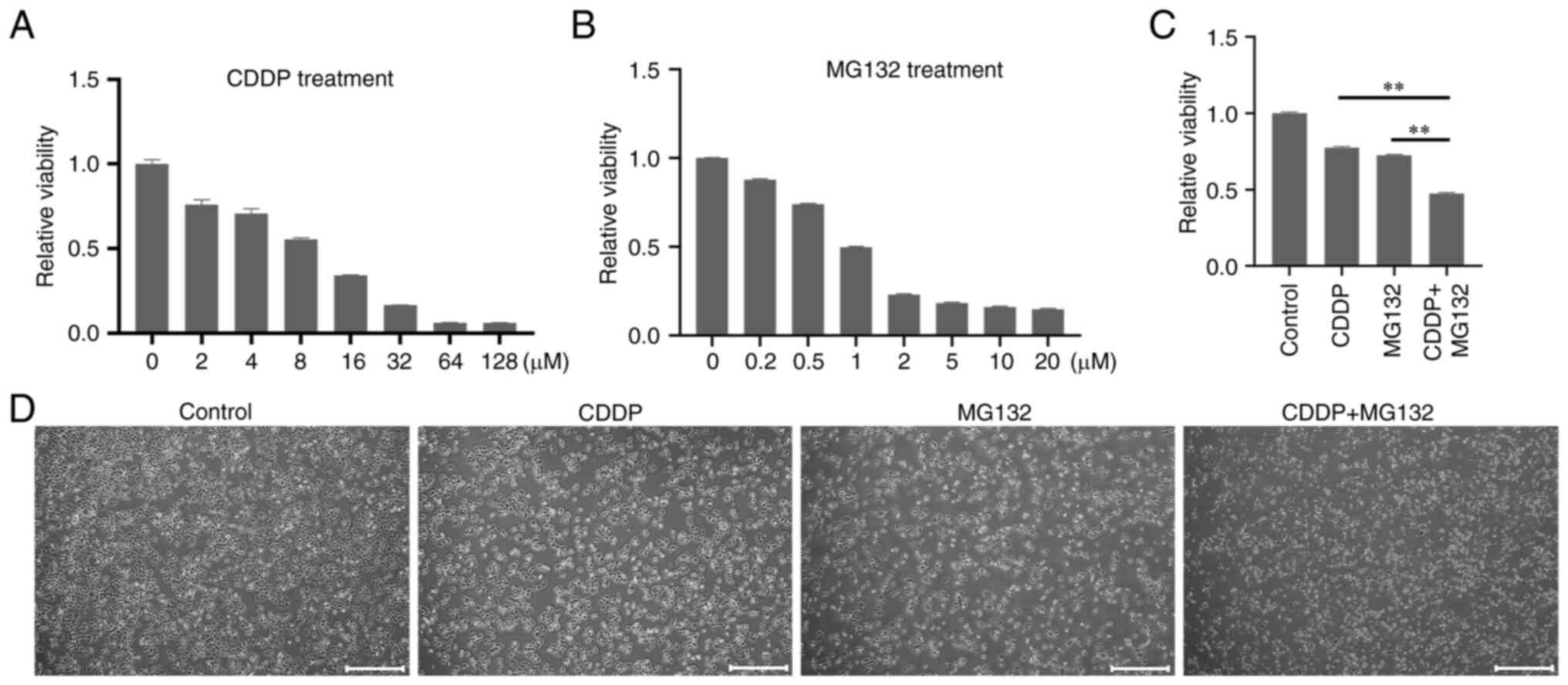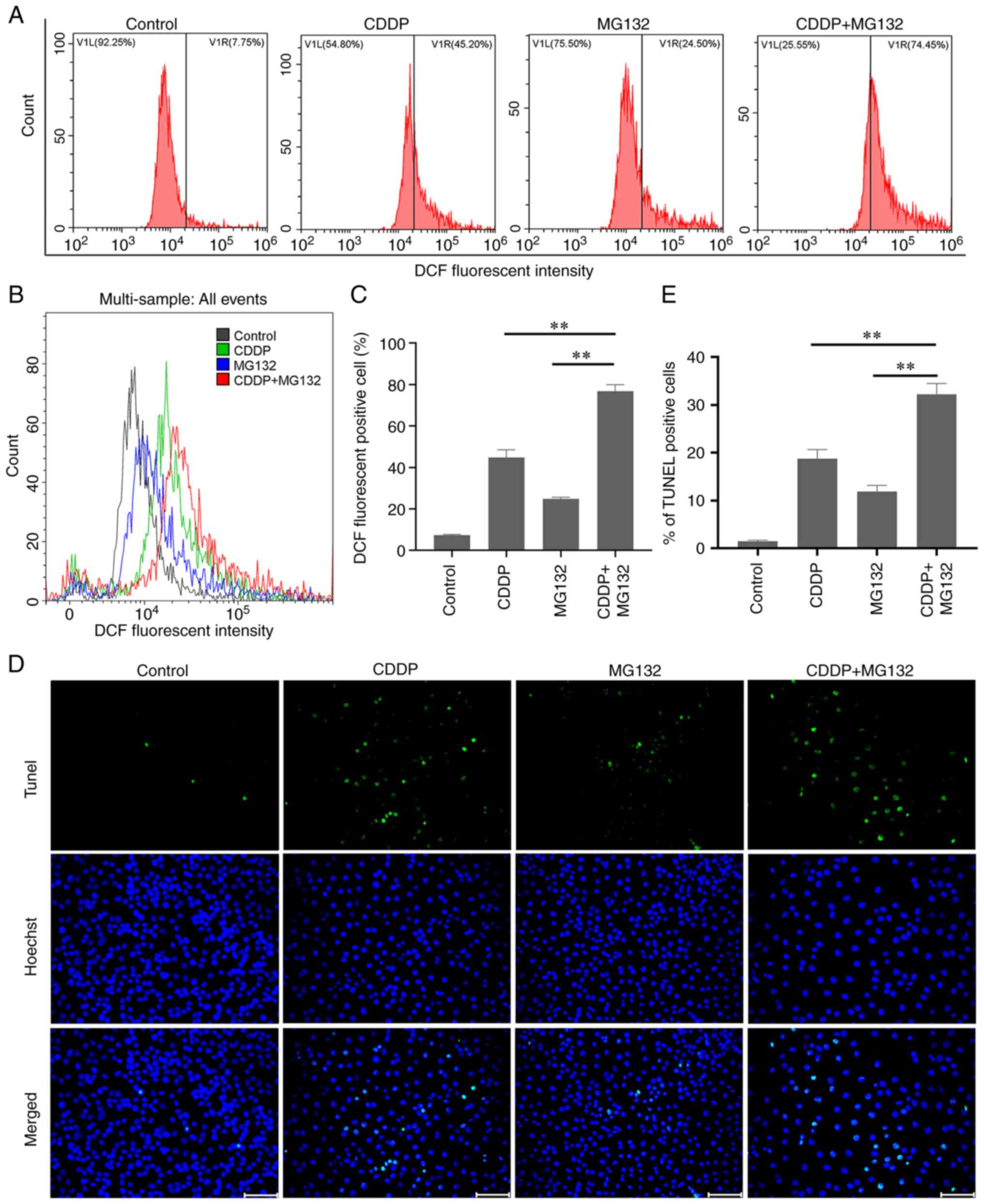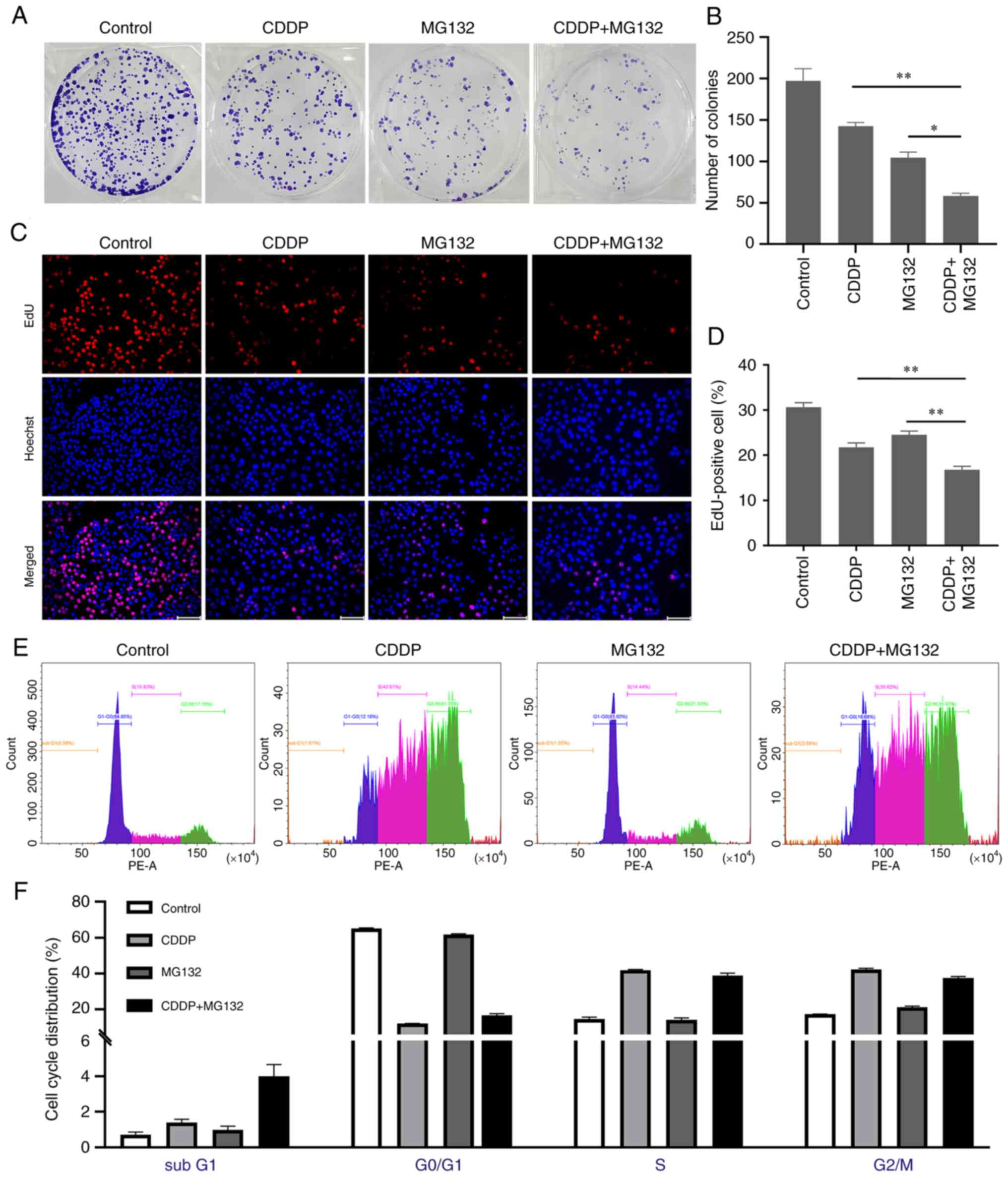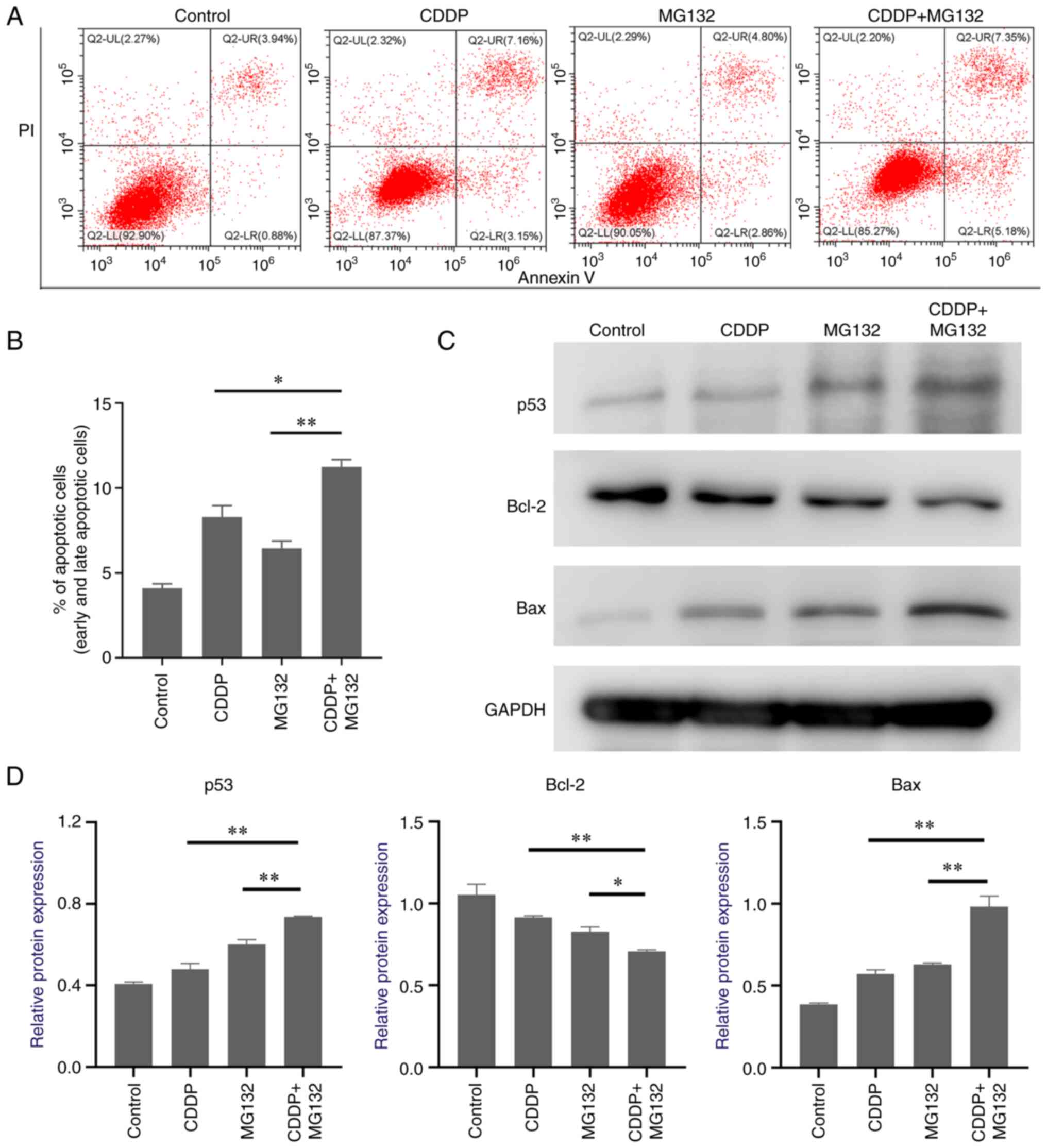|
1
|
Warnakulasuriya S and Kerr AR: Oral cancer
screening: Past, present, and future. J Dent Res. 100:1313–1320.
2021.PubMed/NCBI View Article : Google Scholar
|
|
2
|
Papa F, Siciliano RA, Inchingolo F, Mazzeo
MF, Scacco S and Lippolis R: Proteomics pattern associated with
gingival oral squamous cell carcinoma and epulis: A case analysis.
Oral Sci Int. 15:41–47. 2018.
|
|
3
|
Mohapatra P, Shriwas O, Mohanty S, Ghosh
A, Smita S, Kaushik SR, Arya R, Rath R, Das Majumdar SK, Muduly DK,
et al: CMTM6 drives cisplatin resistance by regulating Wnt
signaling through the ENO-1/AKT/GSK3β axis. JCI Insight.
6(e143643)2021.PubMed/NCBI View Article : Google Scholar
|
|
4
|
Huang SH and O'Sullivan B: Oral cancer:
Current role of radiotherapy and chemotherapy. Med Oral Patol Oral
Cir Bucal. 18:e233–e240. 2013.PubMed/NCBI View Article : Google Scholar
|
|
5
|
Kulkarni B, Gondaliya P, Kirave P, Rawal
R, Jain A, Garg R and Kalia K: Exosome-mediated delivery of miR-30a
sensitize cisplatin-resistant variant of oral squamous carcinoma
cells via modulating Beclin1 and Bcl2. Oncotarget. 11:1832–1845.
2020.PubMed/NCBI View Article : Google Scholar
|
|
6
|
Yuan Y, Xie X, Jiang Y, Wei Z, Wang P,
Chen F, Li X, Sun C, Zhao H, Zeng X, et al: LRP6 is identified as a
potential prognostic marker for oral squamous cell carcinoma via
MALDI-IMS. Cell Death Dis. 8(e3035)2017.PubMed/NCBI View Article : Google Scholar
|
|
7
|
Bassermann F, Eichner R and Pagano M: The
ubiquitin proteasome system-implications for cell cycle control and
the targeted treatment of cancer. Biochim Biophys Acta.
1843:150–162. 2014.PubMed/NCBI View Article : Google Scholar
|
|
8
|
Gupta I, Singh K, Varshney NK and Khan S:
Delineating crosstalk mechanisms of the ubiquitin proteasome system
that regulate apoptosis. Front Cell Dev Biol. 6(11)2018.PubMed/NCBI View Article : Google Scholar
|
|
9
|
Bax M, McKenna J, Do-Ha D, Stevens CH,
Higginbottom S, Balez R, Cabral-da-Silva MEC, Farrawell NE, Engel
M, Poronnik P, et al: The ubiquitin proteasome system is a key
regulator of pluripotent stem cell survival and motor neuron
differentiation. Cells. 8(581)2019.PubMed/NCBI View Article : Google Scholar
|
|
10
|
Narayanan S, Cai CY, Assaraf YG, Guo HQ,
Cui Q, Wei L, Huang JJ, Ashby CR Jr and Chen ZS: Targeting the
ubiquitin-proteasome pathway to overcome anti-cancer drug
resistance. Drug Resist Updat. 48(100663)2020.PubMed/NCBI View Article : Google Scholar
|
|
11
|
Yang H, Chen X, Li K, Cheaito H, Yang Q,
Wu G, Liu J and Dou QP: Repurposing old drugs as new inhibitors of
the ubiquitin-proteasome pathway for cancer treatment. Semin Cancer
Biol. 68:105–122. 2021.PubMed/NCBI View Article : Google Scholar
|
|
12
|
Guo N and Peng Z: MG132, a proteasome
inhibitor, induces apoptosis in tumor cells. Asia Pac J Clin Oncol.
9:6–11. 2013.PubMed/NCBI View Article : Google Scholar
|
|
13
|
Zhu W, Liu J, Nie J, Sheng W, Cao H, Shen
W, Dong A, Zhou J, Jiao Y, Zhang S and Cao J: MG132 enhances the
radiosensitivity of lung cancer cells in vitro and in
vivo. Oncol Rep. 34:2083–2089. 2015.PubMed/NCBI View Article : Google Scholar
|
|
14
|
Qiang W, Sui F, Ma J, Li X, Ren X, Shao Y,
Liu J, Guan H, Shi B and Hou P: Proteasome inhibitor MG132 induces
thyroid cancer cell apoptosis by modulating the activity of
transcription factor FOXO3a. Endocrine. 56:98–108. 2017.PubMed/NCBI View Article : Google Scholar
|
|
15
|
Guo N, Peng Z and Zhang J: Proteasome
inhibitor MG132 enhances sensitivity to cisplatin on ovarian
carcinoma cells in vitro and in vivo. Int J Gynecol Cancer.
26:839–844. 2016.PubMed/NCBI View Article : Google Scholar
|
|
16
|
Dang L, Wen F, Yang Y, Liu D, Wu K, Qi Y,
Li X, Zhao J, Zhu D, Zhang C and Zhao S: Proteasome inhibitor MG132
inhibits the proliferation and promotes the cisplatin-induced
apoptosis of human esophageal squamous cell carcinoma cells. Int J
Mol Med. 33:1083–1088. 2014.PubMed/NCBI View Article : Google Scholar
|
|
17
|
Jiang Q, Wang Z, Qi Q, Li J, Xin Y and Qiu
J: lncRNA SNHG26 promoted the growth, metastasis, and cisplatin
resistance of tongue squamous cell carcinoma through PGK1/Akt/mTOR
signal pathway. Mol Ther Oncolytics. 24:355–370. 2022.PubMed/NCBI View Article : Google Scholar
|
|
18
|
Lü L, Liu X, Wang C, Hu F, Wang J and
Huang H: Dissociation of E-cadherin/β-catenin complex by MG132 and
bortezomib enhances CDDP induced cell death in oral cancer SCC-25
cells. Toxicol In Vitro. 29:1965–1976. 2015.PubMed/NCBI View Article : Google Scholar
|
|
19
|
Jiang Y, Guo H, Tong T, Xie F, Qin X, Wang
X, Chen W and Zhang J: lncRNA lnc-POP1-1 upregulated by VN1R5
promotes cisplatin resistance in head and neck squamous cell
carcinoma through interaction with MCM5. Mol Ther. 30:448–467.
2022.PubMed/NCBI View Article : Google Scholar
|
|
20
|
Huang R, Chen H, Liang J, Li Y, Yang J,
Luo C, Tang Y, Ding Y, Liu X, Yuan Q, et al: Dual role of reactive
oxygen species and their application in cancer therapy. J Cancer.
12:5543–5561. 2021.PubMed/NCBI View Article : Google Scholar
|
|
21
|
Srinivas US, Tan BWQ, Vellayappan BA and
Jeyasekharan AD: ROS and the DNA damage response in cancer. Redox
Biol. 25(101084)2019.PubMed/NCBI View Article : Google Scholar
|
|
22
|
Aubrey BJ, Kelly GL, Janic A, Herold MJ
and Strasser A: How does p53 induce apoptosis and how does this
relate to p53-mediated tumour suppression? Cell Death Differ.
25:104–113. 2018.PubMed/NCBI View Article : Google Scholar
|
|
23
|
Baruah A, Chang H, Hall M, Yuan J, Gordon
S, Johnson E, Shtessel LL, Yee C, Hekimi S, Derry WB and Lee SS:
CEP-1, the Caenorhabditis elegans p53 homolog, mediates opposing
longevity outcomes in mitochondrial electron transport chain
mutants. PLoS Genet. 10(e1004097)2014.PubMed/NCBI View Article : Google Scholar
|
|
24
|
Gonzalez-Campora R, Davalos-Casanova G,
Beato-Moreno A, Garcia-Escudero A, Pareja Megia MJ, Montironi R and
Lopez-Beltran A: BCL-2, TP53 and BAX protein expression in
superficial urothelial bladder carcinoma. Cancer Lett. 250:292–299.
2007.PubMed/NCBI View Article : Google Scholar
|
|
25
|
Han YH, Moon HJ, You BR and Park WH: The
effect of MG132, a proteasome inhibitor on HeLa cells in relation
to cell growth, reactive oxygen species and GSH. Oncol Rep.
22:215–221. 2009.PubMed/NCBI
|
|
26
|
Chen SF, Chen HY, Liu XB, Zhang YX, Liu W,
Wang WH, Zhang B and Wang LX: Apoptotic effect of MG-132 on human
tongue squamous cell carcinoma. Biomed Pharmacother. 65:322–327.
2011.PubMed/NCBI View Article : Google Scholar
|
|
27
|
Tsunoda M, Fukasawa M, Nishihara A, Takada
L and Asano M: JunB can enhance the transcription of IL-8 in oral
squamous cell carcinoma. J Cell Physiol. 236:309–317.
2021.PubMed/NCBI View Article : Google Scholar
|
|
28
|
Lai WT, Li YJ, Wu SB, Yang CN, Wu TS, Wei
YH and Deng YT: Connective tissue growth factor decreases
mitochondrial metabolism through ubiquitin-mediated degradation of
mitochondrial transcription factor A in oral squamous cell
carcinoma. J Formos Med Assoc. 117:212–219. 2018.PubMed/NCBI View Article : Google Scholar
|
|
29
|
Luo F, Zhou Z, Cai J and Du W: DUB3
facilitates growth and inhibits apoptosis through enhancing
expression of EZH2 in oral squamous cell carcinoma. Onco Targets
Ther. 13:1447–1460. 2020.PubMed/NCBI View Article : Google Scholar
|
|
30
|
Wu J, Guo W, Wen D, Hou G, Zhou A and Wu
W: Deubiquitination and stabilization of programmed cell death
ligand 1 by ubiquitin-specific peptidase 9, X-linked in oral
squamous cell carcinoma. Cancer Med. 7:4004–4011. 2018.PubMed/NCBI View Article : Google Scholar
|
|
31
|
He Y, Tai S, Deng M, Fan Z, Ping F, He L,
Zhang C, Huang Y and Cheng B: Metformin and 4SC-202 synergistically
promote intrinsic cell apoptosis by accelerating ΔNp63
ubiquitination and degradation in oral squamous cell carcinoma.
Cancer Med. 8:3479–3490. 2019.PubMed/NCBI View Article : Google Scholar
|
|
32
|
Chen H, Yang H, Pan L, Wang W, Liu X, Ren
X, Liu Y, Liu W, Zhang Y, Jiang L, et al: The molecular mechanisms
of XBP-1 gene silencing on IRE1α-TRAF2-ASK1-JNK pathways in oral
squamous cell carcinoma under endoplasmic reticulum stress. Biomed
Pharmacother. 77:108–113. 2016.PubMed/NCBI View Article : Google Scholar
|
|
33
|
Sung ES, Park KJ, Choi HJ, Kim CH and Kim
YS: The proteasome inhibitor MG132 potentiates TRAIL receptor
agonist-induced apoptosis by stabilizing tBid and Bik in human head
and neck squamous cell carcinoma cells. Exp Cell Res.
318:1564–1576. 2012.PubMed/NCBI View Article : Google Scholar
|
|
34
|
Yoshiba S, Iwase M, Kurihara S, Uchida M,
Kurihara Y, Watanabe H and Shintani S: Proteasome inhibitor
sensitizes oral squamous cell carcinoma cells to TRAIL-mediated
apoptosis. Oncol Rep. 25:645–652. 2011.PubMed/NCBI View Article : Google Scholar
|
|
35
|
Deng D and Shah K: TRAIL of hope meeting
resistance in cancer. Trends Cancer. 6:989–1001. 2020.PubMed/NCBI View Article : Google Scholar
|
|
36
|
Zhang Y, Yang B, Zhao J, Li X, Zhang L and
Zhai Z: Proteasome inhibitor
Carbobenzoxy-L-Leucyl-L-Leucyl-L-Leucinal (MG132) enhances
therapeutic effect of paclitaxel on breast cancer by inhibiting
nuclear factor (NF)-κB signaling. Med Sci Monit. 24:294–304.
2018.PubMed/NCBI View Article : Google Scholar
|
|
37
|
Kim YM and Kim HJ: Proteasome inhibitor
MG132 is toxic and inhibits the proliferation of rat neural stem
cells but increases BDNF expression to protect neurons.
Biomolecules. 10(1507)2020.PubMed/NCBI View Article : Google Scholar
|
|
38
|
Kleih M, Böpple K, Dong M, Gaißler A,
Heine S, Olayioye MA, Aulitzky WE and Essmann F: Direct impact of
cisplatin on mitochondria induces ROS production that dictates cell
fate of ovarian cancer cells. Cell Death Dis.
10(851)2019.PubMed/NCBI View Article : Google Scholar
|
|
39
|
Han YH, Kim SZ, Kim SH and Park WH:
Reactive oxygen species and glutathione level changes by a
proteasome inhibitor, MG132, partially affect calf pulmonary
arterial endothelial cell death. Drug Chem Toxicol. 33:403–409.
2010.PubMed/NCBI View Article : Google Scholar
|
|
40
|
Han YH, Moon HJ, You BR and Park WH: The
attenuation of MG132, a proteasome inhibitor, induced A549 lung
cancer cell death by p38 inhibitor in ROS-independent manner. Oncol
Res. 18:315–322. 2010.PubMed/NCBI View Article : Google Scholar
|
|
41
|
Park S, Park JA, Yoo H, Park HB and Lee Y:
Proteasome inhibitor-induced cleavage of HSP90 is mediated by ROS
generation and caspase 10-activation in human leukemic cells. Redox
Biol. 13:470–476. 2017.PubMed/NCBI View Article : Google Scholar
|
|
42
|
Park WH and Kim SH: MG132, a proteasome
inhibitor, induces human pulmonary fibroblast cell death via
increasing ROS levels and GSH depletion. Oncol Rep. 27:1284–1291.
2012.PubMed/NCBI View Article : Google Scholar
|
|
43
|
Miyashita T, Krajewski S, Krajewska M,
Wang HG, Lin HK, Liebermann DA, Hoffman B and Reed JC: Tumor
suppressor p53 is a regulator of bcl-2 and bax gene expression in
vitro and in vivo. Oncogene. 9:1799–1805. 1994.PubMed/NCBI
|
|
44
|
Zhang Y, Zhang Y, Zhong C and Xiao F:
Cr(VI) induces premature senescence through ROS-mediated p53
pathway in L-02 hepatocytes. Sci Rep. 6(34578)2016.PubMed/NCBI View Article : Google Scholar
|


















